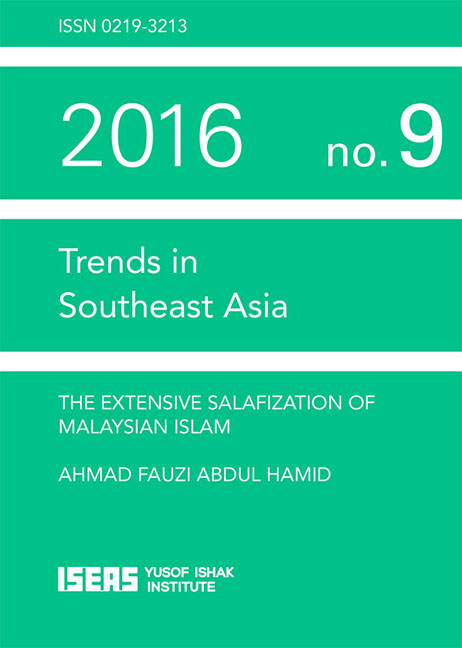The Extensive Salafization of Malaysian Islam
Published online by Cambridge University Press: 09 March 2019
Summary
Several surveys conducted over the past few years by the U.S.-based Pew Research Centre show a growing appeal of Islamist extremism in Malaysia. While absolute numbers may still point to Malaysian Muslims being generally unattracted to radical notions of Islam, some figures pointing in the opposite direction appear staggeringly high when compared to similar figures for Indonesia, particularly since the general impression, in view of the greater number of terrorist attacks in Indonesia, is that Indonesian Islam is much more radical than Malaysian Islam.
These figures have in fact been quoted by several commentators as a warning against the possibility of Malaysian Muslims gravitating towards Islamist violence as manifested by the likes of the Islamic State of Iraq and Syria (ISIS, also known as the Islamic State of Iraq and the Levant (ISIL), or simply the Islamic State (IS) or as Daesh, after its Arabic acronym) and Jemaah Islamiyah (JI) (cf. Raj 2015, Abuza 2016). Already hundreds of Malaysians are known to have joined Katibah Nusantara, the Malay-speaking chapter of ISIS in the Middle East (Chalk 2015, pp. 10–11, Muhammad Haziq and Jasminder 2016, Farrah Naz and Aliza 2016).
Much of the statistics is surprising. For example, proportionately fewer Malaysian Muslims (8 per cent) express worry about Muslim extremist groups than do Indonesian Muslims (53 per cent); the former are concerned more, at 31 per cent, about Christian extremists. And at 18 per cent, the proportion of Malaysian Muslims approving suicide bombing as justifiable is more than double the comparable figure of their Indonesian co-religionists, which is at 7 per cent (Pew Research Center 2013a: 68–71).
A later survey put Malaysian Muslims’ support for suicide bombing as often or sometimes justified at 27 per cent, as compared with the Indonesian figure of a mere 6 per cent (Pew Research Center 2013b). More Malaysian Muslims (11 per cent) also express a favourable view of ISIS than do Indonesian Muslims (4 per cent) (Poushter 2015). It is also telling that Malaysian Muslims greatly surpass their Indonesian counterparts in messianic fervour, with 62 per cent of the former in comparison to only 23 per cent of the latter expecting the redeemer Imam al-Mahdi's advent during their lifetime (Pew Research Center 2012, p. 65).
- Type
- Chapter
- Information
- The Extensive Salafization of Malaysian Islam , pp. 1 - 41Publisher: ISEAS–Yusof Ishak InstitutePrint publication year: 2016



